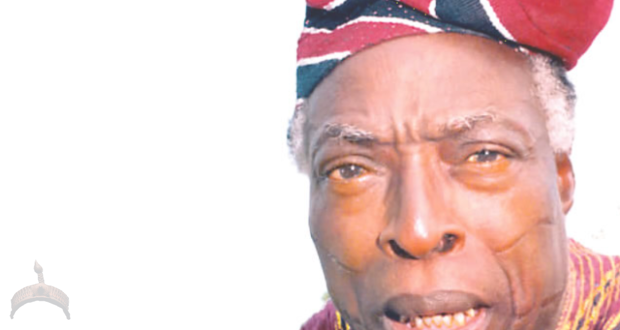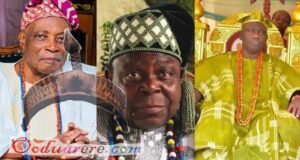Ẹyẹ o dédé bà’lorule ó, ọ̀rọ̀ leye ń gbó o. (Saworoide). Adebayo Faleti has gone to lay with the ancestors. He will be missed greatly.
Sun re O !
Ase
The arts community mourns the passage of multitalented artist and culture promoter, Adebayo Faleti, AKEEM LASISI writes
From writing to broadcasting and acting, Adebayo Faleti straddled the art world like a colossus. He could also sing just as he was a great poet whose mastery of the Yoruba idiom was phenomenal. His death, on Sunday, has thus jolted many people, although he died at the age of 86.
In a tribute to the artist, the Minister of Information and Culture, Alhaji Lai Mohammed, notes that his impact was real both in the arts and culture sector and on broader national scene.
Mohammed says in a telephone interview with our correspondent, “We will really miss him. Pa Faleti, as he was fondly called, was not just a successful Thespian and broadcaster, he was also a patriot. He provided an example to follow when it comes into investing one’s intellect and talent in the propagation of one’s heritage. As he was doing this in probably all areas of the arts and entertainment, he was also participating in programmes and projects that could directly or indirectly impact positiviely on national development. So, his legacies should console us. I believe we all need to come together to celebrate and immortalise him, and I will be ready to be in the forefront of doing that.”
Many youths would identify Faleti with the country’s contemporary film industry. He was one of the actors who provided the industry with the intellectual strength that helped to stabilise it. In this sense, many will remember his roles in major films such as Saworoide and Thunderbolt, produced by Tunde Kelani, where Faleti worked with the likes of Prof. Akinwumi Isola, the late Dr. Larinde Akinleye and Laide Adewale.
Faleti deployed his deep insight into the Yoruba world view, his experience as a broadcaster, producer and creative writer to his activities on stage and screen. But this is the kind of feat he was simply used to. Those who had been following his marks, especially as a poet in the Yoruba genre, will situate him among legends such as Lanrewaju Adepoju and the late Ogundare Fonyanmu, an ijala chanter. His collections of poems, including Ewi Adebayo Faleti, as well as his prose works that include Ogun Awitele, stood him out as an iconic disciple of the muse. When he thus passed away on Sunday, it was the proverbial passage of another human library.
Indeed, one of his acolytes, Tunde Kelani, believes the impact of the loss could be more penetrating than that. According to him, Faleti’s death is like setting a museum ablaze because he believes he represented the best of the people’s heritage.
“We thank God for his life,” Kelani says. “There is also the consolation that we can always revisit many of the creative works he left behind. But we must also be bold enough to observe that he was part of a breed that cannot be replaced. Or, in our present circumstance of cultural, educational and economic regression, can we still produce a true icon like Faleti? I am happy that I met people like him early enough – since the Western Nigerian Broadcasting Services days – and received the mentoring that I have continued to build upon.”
Kelani adds that his experience with the ‘three musketeers’ (as Ishola, Akinleye and Faleti were popularly called) was very impactful because they not only acted in his acclaimed movies, but also contributed to the script development and production.
Also, poet and essayist, Odia Ofeimun, describes Faleti’s death as painful. According to him, the deceased was a serious and colourful poet.
Ofeimun says, “I always thought his book would be translated into English while he was still alive. Nigeria is an unserious country. If we were a serious people, we would be translating works in indigenous languages into English so that people from other cultures and with different languages would be able to read them.”
Veteran actor and producer, Jide Kosoko, in an interview with our correspondent, notes that Faleti laid a good example for other professionals to follow. According to Kosoko, he was not just a delight as an entertainer and culture promoter, his character was also instructive.
“That was a good man; a good father to all of us. He was always very honest in his assessment of issues. If he had any fault, I think that was the fact that he was always too factual when speaking on issues. Baba Faleti would never call black ‘red’ even if that would displease his listener,” Kosoko explains.
Members of the Ibadan Film Circle have also mourned Faleti. The online group, comprising the likes of Tade Ogidan, Segun Arinze, Greg Odutayo, Remi Raji, Joke Muyiwa, Dele Odule, Ropo Ewenla, Ademola Aremu, Dele Morakinyo and Tunde Olaoye, note in a statement that the deceased was a shining light.
In a statement by the IFC’s initiator, Niji Akanni, they say Faleti represented the best in all areas he touched.
The film-makers aver, “We know it is a big loss, but we know death is inevitable. It is a drama in which everyone has a role, a role that must be played when it is one’s turn – or episode if you like. As a writer, Pa Adebayo Faleti penetrated all areas of life. As an actor, he was one of those that can be described as play-makers. Without indulging in any petty practice, he gave the audience and viewers the very best.”
Foremost playwright, Prof. Femi Osofisan, salutes Faleti as a pillar of Yoruba culture. He explains that if people mourn Faleti, it is not because he did not live long enough, but because the gap he is leaving behind is puzzling.
Osofisan says, “I am not sure there will be a replacement for him. Where will you get another person with such deep insight and rare power of transmission of the cultural heritage?”
In another tribute, scholar and dancer, Rasaki Ojo-Bakare, highlights Faleti’s many parts. He writes on Facebook, “Alagba Adebayo Faleti, poet, playwright, actor, producer, teacher and scholar. You came for Yoruba language and culture to live. You taught us to respect how we were created and what we are made to be. You lived life to the fullest, loved humanity to the fullest, served us to the fullest and left us better than we met you. Good night, Baba. Rest well, Awo ire. The torch you passed unto us shall be kept aglow.”
Faleti was born on December 26, 1930. Beyond his involvement in creative works and broadcasting, he was a Yoruba translator, with one of his marks being the translation of the National Anthem into Yoruba.
 Ọmọ Oòduà Naija Gist | News From Nigeria | Entertainment gist Nigeria|Networking|News.. Visit for Nigeria breaking news , Nigerian Movies , Naija music , Jobs In Nigeria , Naija News , Nollywood, Gist and more
Ọmọ Oòduà Naija Gist | News From Nigeria | Entertainment gist Nigeria|Networking|News.. Visit for Nigeria breaking news , Nigerian Movies , Naija music , Jobs In Nigeria , Naija News , Nollywood, Gist and more









